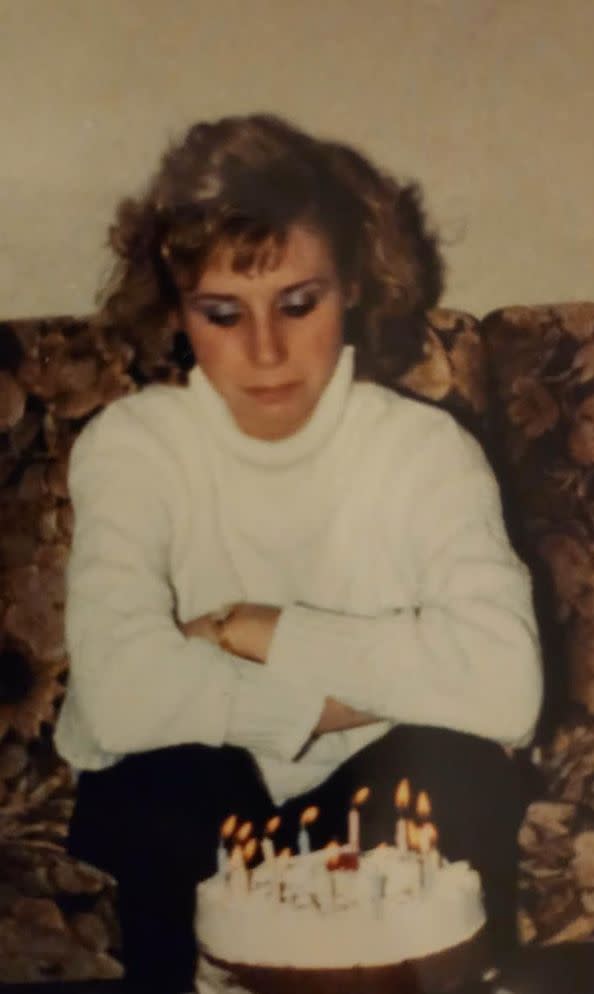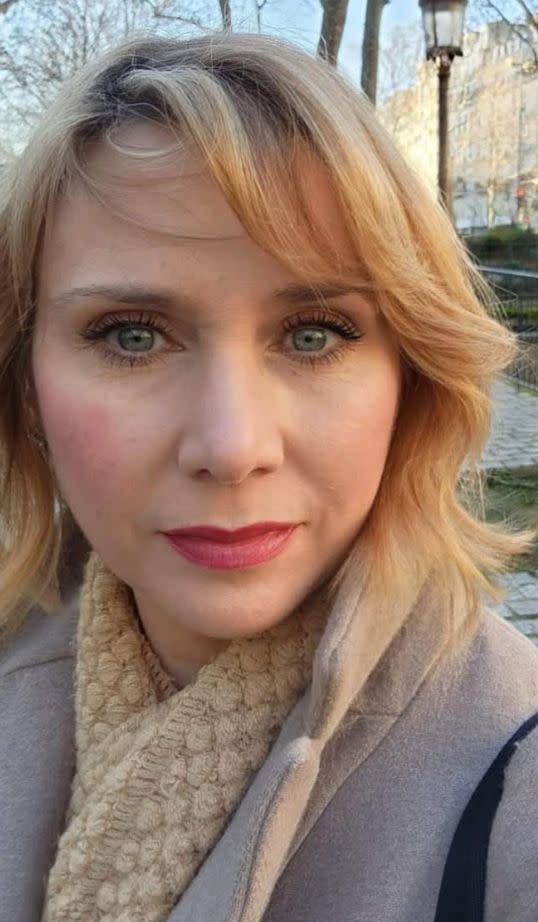I Was 15 When I Started Partying With Rock Stars. I Told No One What They Did To Me — Until Now.
The author, age 14, with her father.
I had just stepped foot on the tour bus of my favorite rock band, after my friend and I were miraculously offered backstage passes moments before. I’d dreamed of this day for years and now, at age 15, it was finally coming true.
A few hours earlier, I’d been at my friend Tiffany’s house getting ready for the concert. It had taken me weeks to put together a plan convincing enough to get by my parents. They didn’t approve of me hanging out with Tiffany, who had a boyfriend, wore makeup and could stay out as late as she wanted ― which were all against the rules for me. As far as my parents knew, when I left the house that summer afternoon, I was going to a concert with someone else entirely.
At Tiffany’s, we blasted music, drank wine coolers and smoked her mom’s Marlboro cigarettes. We teased our hair, applied thick swipes of black eyeliner and dressed in our matching black leather skirts. An hour later, Tiffany’s mom dropped us off at the venue. Arriving three hours before the show started, we excitedly waited in line, hoping to get as close to the band as possible ― especially the lead singer, whom I adored.
I grew up in a musical family ― my dad and brothers had all been in bands at one time or another ― and I fell in love with music at an early age. With a basement filled with guitars, amps, microphones and a drum set, I spent hours writing lyrics to songs and sneaking down there to sing when no one else was around.
When I was 11 and we got cable, MTV flooded our living room with music videos for the first time. Mesmerized by the rock bands of the ’80s, I wanted to both meet them and be them. One band became my favorite. After getting one of the group’s albums for my 12th birthday, I pored over the pictures on the cover, memorized the lyrics to all of the songs and wrote hopeful letters to the band’s fan club, naively believing I would get a reply.
About a year later, at age 13, I begged my mom to let me accompany her friend, who was going to see the group in a city less than two hours away. She said no — I was too young ― but when I woke up the morning after the concert, I was overjoyed to find a band T-shirt hanging from my pink canopy bed. I treasured the shirt so much that I was afraid to wear it because it might get ruined.
In my teen years, life became challenging as I questioned the rules of my conservative Catholic parents and struggled to conform to the pristine expectations of my father. I rebelled, diving deeper into the escapism that music provided and becoming hyperfocused on meeting the band. Early in the summer when I was 15, an ad announcing the band was coming to my hometown came over the radio and I knew I was going ― whether my parents gave me permission or not.

The author on her 17th birthday. "I had stopped going to concerts around this time," she writes.
As Tiffany and I waited in line outside the arena, a tour bus pulled in and drove around back. Thinking the band might be inside, we left our place in line and went to find where it was parked.
A few minutes later, we were staring at the vehicle’s dark windows, attempting to see inside, when the bus door flung open. I gasped. A man I instantly recognized as the lead singer stepped out. He smiled and walked toward us.
“Are you here to see the show?” he asked.
“Yes,” Tiffany and I replied.
After talking for a few minutes, he gestured toward the arena and indicated he needed to go inside.
“Would you like backstage passes for after the show?” he asked
Bursting with excitement, we couldn’t get the words out fast enough. “Yes!” we told him.
A surreal feeling pulsed through me as the guitar player and a roadie then led us onto the bus. It looked like a house inside with a kitchen nook, long couches lining the walls and lavishly decorated woodwork. There was a curtain that separated one area of the bus from the other.
They offered us beers and made small talk before the roadie got up and led Tiffany to an area on the other side of the curtain. Not long after, the guitar player took me to a small, dimly lit bedroom. Sitting on the edge of the bed with his hand on my leg, he slowly inched it under my skirt. Feeling afraid, I pulled away.
“Where’s Tiffany?” I asked. He kissed me, and then pushed my head toward his penis.
“She’s getting her backstage pass,” he said. “When we’re finished, I’ll give you yours.”
A half-hour later, reunited with Tiffany, we took our backstage passes and left the bus. Seated in the section of the arena reserved for friends of the band, we shared grossly similar stories. Disgusted, we promised to tell no one what happened. Perversely, we stayed at the show. We were ecstatic about our passes. We knew what those men had just done to us felt wrong, but we were so caught up in the high of being close to our idols that we pushed our disgust to the pit of our stomaches and tried to forget what had just occurred.
After the show, at the backstage party, I finally got to talk to the singer of the band. I told him I’d been a fan for years and had all their albums. A burly man with a Polaroid camera took our picture and handed me a copy. It overjoyed me when the singer signed it. I still have it today.
In fact, I have a photo album filled with pictures, backstage passes and autographs of all of the bands I met between the ages of 15 and 17. I became the envy of friends who saw photos of me partying with rock stars — but they didn’t know the dark secrets behind them. By the time I was 16, three different men from three bands had sexually assaulted me. I told no one what happened, least of all my parents, whom I feared would blame me.
Years later, I ended up in a therapist’s office. I was suffering from anxiety, had developed an eating disorder and was obsessed with how unattractive I looked. (In a decade’s time, this would be diagnosed as body dysmorphic disorder.) There was no clear identifier linking my mental health problems with the sexual assaults, but after months of therapy, deep feelings of shame rose to the surface. Eventually, I could finally admit what happened backstage and in hotel rooms with those bands.
At first, the more I revealed, the sicker I felt. But in hearing my voice purge the details, it became apparent for the first time that I had done nothing wrong. I wasn’t bad. I didn’t deserve what those men did to me . I desperately needed to tell someone everything in a safe space so that I could release the shame that was suffocating me.

The author in December.
Recently, I heard the news that musician R. Kelly was sentenced to 20 years in prison for child pornography and enticement of minors for sex. That same day, film producer Harvey Weinstein was sentenced to 16 years for rape and sexual assault. As I read the reports, anxiety bubbled up, taking me back to memories of the blind adoration I had for those famous men that led to being victimized. I hurt for these women preyed upon by men who abused their power and privilege, forever altering their lives. I knew too well the long-lasting effects. And I know there are too many other women who have been traumatized in the same way.
But there was something more — a feeling of kinship with fellow survivors, empowered by their strength in standing up to perpetrators, and knowing the monumental act of courage it takes to do so. Healing ― and sometimes even justice ― can come from telling our stories.
Though I have previously written about another sexual assault I experienced later in my life, I have never publicly spoken about what happened to me with the men I idolized all those years ago ― until now. It took me years to get over what happened, to stop blaming myself and to heal.
In the early years after the assaults by those famous men, I had little insight into how they had affected me. I didn’t even recognize I had been assaulted until I landed in that therapist’s office. I lived with feelings of disgust and shame every day, struggling to get past them and not understanding the connection between what had happened and what I was experiencing.
Over time, I made progress, but it would ebb and flow. Occasionally, I’d hear people in my inner circle ― family, friends or co-workers — talking about a woman who’d had experiences like mine, and I would have a setback. “Why didn’t she fight back?” they asked. “Why did she willingly go with the man? Why had she dressed so promiscuously? Why hadn’t she come forth sooner?” Each time, I wanted to say something, but instead, I silently stuffed my shameful feelings back down again.
Ultimately, I found that mental health treatment, continuous self-work and time were my way out of the darkness. I’ve been in therapy, on and off, for 30 years. I engage in a spiritual practice that includes prayer and meditation every morning. I read self-growth books and repeat positive affirmations. These have served as the backbone of my recovery. I still have setbacks ― especially after the other sexual assault experience that occurred years ago, which made me once again question myself in devastating ways ― but I am constantly working to recognize them and do whatever I can to keep moving forward.
Fame can make people do strange and sometimes awful things. And the lure of fame ― or being up close next to it ― can make others put themselves in situations they shouldn’t (and would never normally want to) be in. I can’t change what happened to me. My experiences, for better or worse, have made me who I am. But I realize now that I have a choice in what I do with them. My hope is that maybe my story will reach someone who needs to hear it and it will make a difference.
Note: Names and some details have been changed to protect the privacy of individuals mentioned in this essay.
Tammy Rabideau is a writer living in Madison, Wisconsin. Her writing has been featured in The New York Times, The Washington Post, Newsweek and others. She is working on a memoir based on her New York Times “Modern Love” essay. You can follow her on Twitter at @TammyRabideau2 or visit her website at tammyrabideau.com.
Need help? Visit RAINN’s National Sexual Assault Online Hotline or the National Sexual Violence Resource Center’s website.
If you’re struggling with an eating disorder, call the National Eating Disorder Association hotline at 1-800-931-2237.
Do you have a compelling personal story you’d like to see published on HuffPost? Find out what we’re looking for here and send us a pitch.

